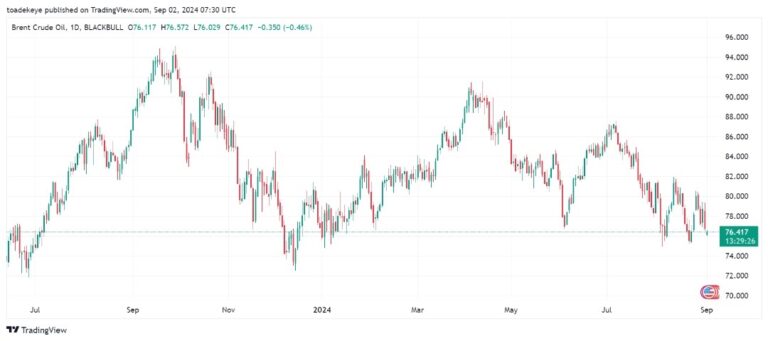Post Views:
110
Taiwo Adekeye, FMVA
Research Analyst
Oil prices dropped approximately 2% on Tuesday due to concerns that slower economic growth in the U.S. and China might decrease energy demand. Brent futures fell by 2.3% to settle at $79.55 per barrel, while U.S. West Texas Intermediate (WTI) crude decreased by 2.4% to $75.53. However, indications suggest that the Federal Reserve is likely to adopt a dovish stance at its September policy meeting, which could potentially boost economic growth and increase oil demand.
USconsumer confidence surges to 103.3
In August, U.S. consumer confidence reached its highest level in six months, driven by positive economic outlooks. However, concerns about the labor market increased as the unemployment rate surged to 4.3%, the highest in nearly three years. consumer confidence index increased to 103.3 this month, the highest level since February, from an upwardly revised 101.9 in July.A surging consumer confidence index signals a healthy economic outlook, with consumers feeling optimistic about their financial futures and contributing to broader economic activity.
Germany’s economy declines by 0.1%
The German economy shrank by 0.1% in the Q2 2024 after the slight increase in the previous quarter. However, the 0.1% contraction in gross domestic product included a 2.2% plunge in capital investment and a 0.2% drop in private consumption In the first quarter of 2024, German gross domestic product rose by 0.2% quarter on quarter.
Nigeria’s Q2 GDP Up by 3.19%
Nigeria’s Gross Domestic Product (GDP) experienced a year-on-year growth of 3.19% in real terms during the second quarter of 2024.This surge in Q2 2024 was primarily driven by the Services sector, which grew by 3.79% and contributed 58.76% to the total GDP. The agriculture sector saw a growth of 1.41%, slightly down from the 1.50% growth recorded in Q2 2023. However, The GDP growth rate surpasses the 2.51% recorded in the second quarter of 2023 and the 2.98% growth seen in the first quarter of 2024. In terms of GDP share, the industry and services sectors contributed more to the total GDP in the second quarter of 2024 compared to the same period in 2023.








